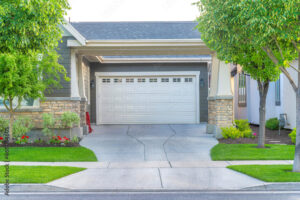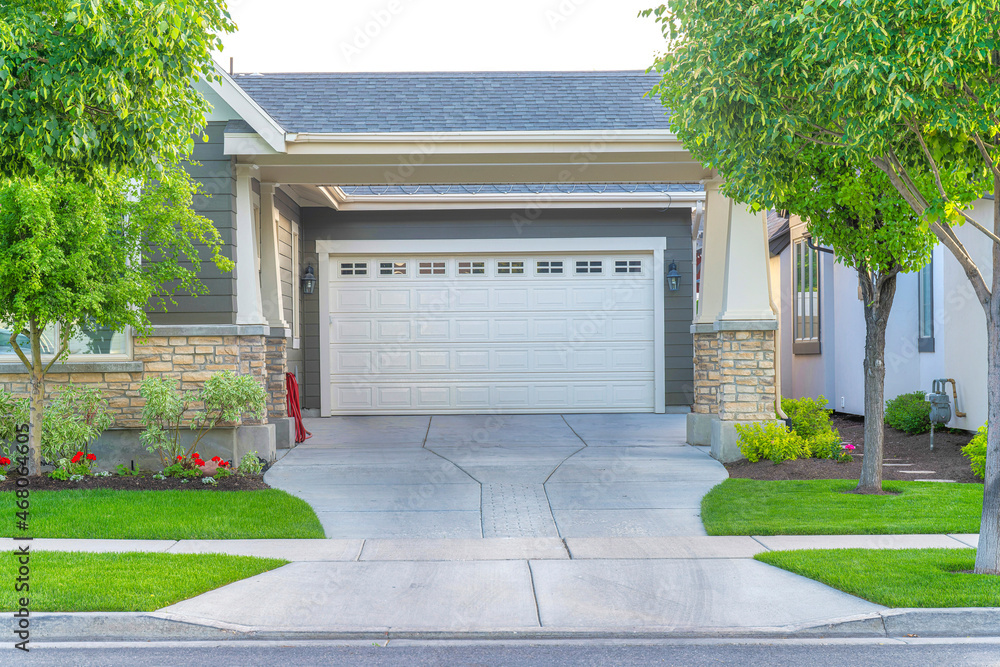Driveway pavers are an attractive alternative to poured concrete and asphalt. They come in many colors, shapes, and textures and can be laid in various patterns to realize unique design effects. A well-installed driveway made from pavers requires little maintenance. Unlike poured concrete or asphalt, it doesn’t need to be resealed regularly. Visit https://drivewaypavingcharleston.com/ to find the best option for you.

Brick pavers offer a classic style to any driveway and are very durable, lasting for generations and outlasting most other surface materials. They also require less maintenance than poured concrete and are very easy to repair should damage occur. In addition, they are skid-resistant and can help with traction. They can be a little more expensive than other pavers but are a good option if you want your driveway to have a traditional look and feel.
Pavers are available in various shapes, sizes, colors, and textures. Different combinations of these materials can create distinct visual effects that set your driveway apart. Popular options include running bond, herringbone, basket weave, and ashlar pattern. Choosing the right bricks, pavers, and layout for your driveway will depend on several factors, including your budget and the aesthetic you’re going for.
When selecting bricks, it’s important to consider their color and texture. Bricks aren’t limited to orangey reds but can be a wide range of colors based on the minerals in the clay and how they’re fired. Quick bursts of high heat can produce darker tones, while longer flashes can create softer mauves and terra-cottas.
Unlike other types of pavers, bricks are often laid without mortar. They are placed on a gravel or sand bed and secured with a special binding agent. The spaces between the pavers are filled with sand, and the binding agent helps prevent weeds, moss, and other growth from growing between them.
The color of the sand will also affect how well the bricks retain moisture and sunlight, which can impact how much wear they receive. Regardless of the color, it’s important to seal your brick driveway once it’s installed to help protect it from moisture and prolong its lifespan. Regularly sweeping and spraying with a hose is also a good idea to remove any lingering debris that might have built up over time. It will keep the sand between the bricks clean and free from moss, weeds, and other unwanted growth that can impact the length of your driveway.
Concrete pavers are versatile, durable, and cost-effective for driveways. They are available in various colors, sizes, and textures and can be combined in many ways to achieve unique visual effects. Concrete pavers are usually less expensive than brick pavers and have the added advantage of a lower maintenance cost.
Concrete paver options include stone-like pavers made of crushed granite or other natural stones, clay brick-like pavers, and a variety of different styles that are manufactured to resemble other types of naturally occurring paving materials such as cobblestones, flagstones, or even modern or classic brick. They are also manufactured in various surface textures, including smooth or tumbled, herringbone, and other patterned layouts and mixed pavers.
They are laid over a prepared base of crushed rock and compacted soil, with sand between each paver for stability and to prevent movement. They can be installed in a random pattern or a more structured grid and may include edging to keep the pavers in place. Concrete pavers are a good choice for areas with heavy traffic because they hold up to vehicle loading better than concrete slabs.
Pavers are an attractive alternative to poured-in-place concrete or asphalt for residential and commercial applications. They are also suitable for walkways, patios, and pool decks. They are easy to maintain and offer a more attractive surface than poured-in-place concrete or blacktop. They are less expensive than stamped or textured concrete. They are very durable and resist fading from UV rays. They also do not stain as easily as poured-in-place concrete.
Pavers are also easy to repair or replace if damaged. They are very quiet to walk on and provide a safe, skid-resistant surface for driving. They are also good for cold climates because they withstand freezing and thawing cycles and de-icing salts more effectively than asphalt or traditional poured-in-place concrete. They are also easy to snow plow, blow, or shovel and have beveled or chamfered edges to prevent catching on snow plows or shovels.
Porcelain pavers have recently gained popularity among homeowners because of their beauty, durability, and price. These driveway pavers are made of high-quality clay that is put through a special kiln at extremely hot temperatures, creating a dense and waterproof material. It allows them to withstand harsh weather conditions and heavy traffic, saving homeowners money on costly repairs.
Additionally, unlike natural stone pavers, porcelain pavers can be manufactured to resemble other materials, such as wood or stone, in terms of color and texture. It allows homeowners to flow seamlessly between their interior and outdoor living spaces. With modern manufacturing techniques, adding slip-resistant surfaces to these pavers is possible, ensuring that they remain safe in wet areas and rainwater.
The color options available for these pavers are also highly diverse, allowing homeowners to match them to their existing home or outdoor furniture. For example, Porcelain Pavers blend beige and cream hues to complement various cabinet colors and styles. At the same time. Pavers can mimic the look of granite for a timeless and sophisticated appeal.
These pavers also feature a non-porous surface impervious to liquids, making it easy for homeowners to clean them with a pressure washer and mild detergents. This resistance to chemical substances is particularly important compared to other paving materials, like concrete, that are more susceptible to damage from harsh chemicals such as de-icing salts.
In addition, the fact that these pavers are manufactured in the US means they are a more affordable option than natural stone products, as these are often subject to expensive shipping, import fees, and distributor cuts that increase their initial cost. These pavers are also easy to install, requiring minimal preparation and only needing to be laid on a level surface, Adding to their affordability. However, this means that the installation process should be left to professionals with experience working with these pavers.
As with other paving materials, these pavers must be properly installed to ensure longevity and durability. When not installed correctly, these pavers may become uneven over time, causing lateral movement that can lead to cracks and other structural problems. Additionally, vehicles can easily lift or move pavers that are not properly anchored to the sub-base, which can further damage the surface.
Many homeowners and business owners choose permeable pavers, also known as porous ones, for their environmental benefits. These paving stones allow rainwater to pass through and evaporate into the groundwater system instead of flowing into storm sewers, reducing the amount of water that can clog streets, gutters, and sewer lines. Permeable paving stones are used to build driveways, walkways, patios, and parking lots in residential and commercial applications.
One of the most important reasons to use permeable paving stones is that they prevent erosion. When traditional concrete or asphalt pavements are used on a sloped surface, the water runs off the bottom of the structure and flows into streams or rivers, where it can cause flooding and soil erosion. Permeable paving stones allow rainfall and snowmelt to soak into the earth rather than run off the surface and down the slope, which reduces erosion.
Permeable paving stones are constructed with an aggregate base that acts as a filter for rainwater, which can remove pollutants before they flow into the drainage system or natural water sources. It can reduce or eliminate contaminants like suspended solids, total phosphorous, chemical oxygen demand, zinc, and motor oil from reaching creeks and inter-tidal zones where they can harm ecosystems.
Another benefit of using permeable paving stones is that they are durable and long-lasting, requiring less maintenance than other hardscape surfaces. They don’t need to be resealed or resurfaced as frequently as different paved surfaces and can handle freeze-thaw cycles well. Additionally, if you are concerned about mosquitoes, permeable paving stones will help reduce their population because they limit access to standing water where mosquitoes breed.
If you are interested in using permeable paving stones, check with your local municipality to see if there are any restrictions on how much impervious surface you can have on your property. Many cities have programs that offer rebates for installing these eco-friendly materials. These programs are available for both new construction and retrofitting existing structures. Generally, the more square footage you cover with permeable paving stones, the higher the rebate amount.
